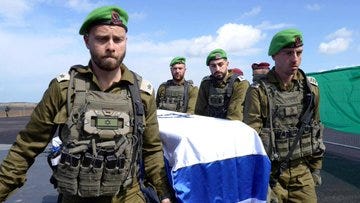Mourners´ Kadish for the Peace Process
And today, the Jewish people, as one, tear our garments in mourning and recite Kaddish for the dead. For our dead. Because they are ours, even if we never knew them. Because they are ours, even if many cannot grasp the ours-ness that binds Jews together in tragedy.
Shiri, Ariel, Kfir, and Oded are ours. They are mine. They belong to my husband, who has spent the week holding back my tears. They belong to my mother, who cannot stop crying. They belong to my children, who look at me with fear and ask questions I do not know how to answer. They belong to the secular Jew and the religious Jew. To Jews of the left and the right. They belong to all of us.
And they belong, too, to the very few (the very few) non-Jews who grasp the magnitude of this tragedy—who, without falling into the easy game of social media and binary truths, truly understand what is happening.
Few comprehend the collective mourning of the Jewish people today. The devastation we feel. Because it was not just the Bibas family who died; with them died any remaining hope for peace.
As their bodies were handed over—amidst cheering crowds (not just Hamas, but Palestinian civilians too), with music blaring—suddenly, the skies opened, and rain fell. God weeping. In our image, in our likeness.
And let there be no mistake: Kfir, Ariel, and Shiri are no more precious than any other hostage or murdered soul. But their deaths reveal something else. They rip the scabs off wounds we had begun to grow numb to over this past year.
Today, we say mourners Kaddish. For those tiny, red-haired, beautiful children. For the unimaginable suffering of their families—above all, Yarden, a man who went from the hell of captivity to the hell of burying his entire family.
Mourners Kaddish for the world’s indifference. For those who, for some sickening reason, still justify the kidnapping and murder of these children. For those who minimize it. For those who “put it in context.” For those who still see this war as a game of tit-for-tat and speak of proportionality.
Mourners Kaddish for the viral irrationality of our time, where so many remain blind to the horror and absolute evil that Hamas embodies. Evil, distilled into madness. Packaged into a story, a post, a video—ready to be consumed as absolute truth by millions.
Who, in their right mind, kidnaps a mother clutching her two children, murders them, bargains with their bodies like currency, and then, upon returning them, turns it into a public spectacle?
Right mind—that is the point. They are not just wretched; they are devoid of reason. Any trace of humanity erased by religious fanaticism.
And today, with a pain in my heart I can hardly bear—because I have always believed peace was possible—we say Kaddish in mourning for the peace process itself.
We say mourners Kaddish for the hope some of us still held that one day, something resembling peace might exist. Im tirtzú ein zo hagadá—if we will it, it is no dream—we repeated Herzl’s words, believing peace could come. And let me be clear: When I say peace is impossible, I do not mean that this war should last a second longer than necessary. Enough blood and tears, said Rabin. But the fantasy of two states coexisting in harmony? That dream is dead.
Today, as I watch the nightmarish spectacle Hamas orchestrated to return those tiny coffins, Jabotinsky’s words thunder in my mind: We are not here to teach morality to our enemies.
Today, we sit in mourning and say Kaddish.
Tomorrow, we will stand and defend ourselves.
Yitgadal v’yitkadash sh’mei raba. B’alma di v’ra chirutei, v’yamlich malchutei, b’chayeichon uv’yomeichon uv’chayei d’chol beit Yisrael, baagala uviz’man kariv. V’im’ru: Amen.
Exalted and sanctified be God’s great name in the world He created. May His presence be revealed in our days and in the days of all Israel, swiftly and soon. And let us say: Amen.





